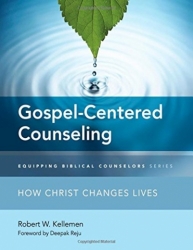Guest blog by Robert W. Kellemen, author of Gospel-Centered Counseling
I was recently interviewed on a national podcast about my book Gospel-Centered Counseling: How Christ Changes Lives. Two of the most interesting questions related to trends and opportunities in biblical counseling.
Trends in Church-Based Counseling Ministry
 I see three significant trends. The first trend is a movement away from the idea that we have to refer everything out to outside experts. If the Bible truly is rich, robust, and relevant for daily living, as Gospel-Centered Counseling teaches, then it is sufficient to help us to speak gospel truth in love so that we all grow up in Christ.
I see three significant trends. The first trend is a movement away from the idea that we have to refer everything out to outside experts. If the Bible truly is rich, robust, and relevant for daily living, as Gospel-Centered Counseling teaches, then it is sufficient to help us to speak gospel truth in love so that we all grow up in Christ.
So, this first trend involves a growing confidence in the power of God’s Word and in the church’s power to change lives with Christ’s changeless truth. It reflects the confidence that the Apostle Paul had when he spoke to the “average, ordinary” believers in small house churches dotting the Roman countryside. “I myself am convinced, that you yourselves are full of goodness, complete in knowledge, and competent to counsel one another.”
The second trend I see is a movement away from the pastor doing all the work of counseling to the pastor equipping God’s people to be competent to counsel. God does not call pastors and church leaders to hoard the ministry. God calls pastors to equip the saints to speak the truth in love.
Increasingly, I’m seeing pastors, churches, Bible Colleges, and seminaries focusing on every member ministry, on one-another ministry, and on small group ministry where we are all equipped to counsel. For example, at Crossroads Bible College where I teach, our department is not simply the Biblical Counseling department. It’s the Biblical Counseling and Equipping department. We want every student to graduate not only being able to do the work of counseling, but to be equipped to equip others to be competent biblical counselors.
The third trend I see is a movement toward counseling as a ministry not only for the congregation, but also for the community. For example, Faith Church in Lafayette, IN, under the leadership of Pastor Steve Viars, has 25 biblical counselors counseling 100 people every Monday. Typically, at least 75 of those 100 people are from the community and not from the congregation.
Biblical counseling is missional—it is for outreach, it is evangelistic, it is for engaging and impacting our communities for Christ. If the gospel truly has answers for everyday living as Gospel-Centered Counseling indicates, then we should not hoard those answers within the church. We should be sharing those answers with a desperately needy world through gospel-centered counseling.
Opportunities in Church-Based Counseling Ministry
To ponder opportunities in biblical counseling, let’s think for a moment about a phrase often used in the small group movement. Small group advocates do not want a church with small groups, but a church of small groups. A church with small groups just has small groups as one program in the church, rather than having small groups as the central focus through which people speak gospel truth in love one to another.
The same focus is increasingly becoming true in the biblical counseling world. We don’t want churches just with biblical counseling; we want churches of biblical counseling. A church with biblical counseling would be a church where a pastor and a few others have a couple of offices and they do some formal weekly scheduled counseling. A church of biblical counseling is a church that is saturated with a biblical counseling mindset.
What is a biblical counseling mindset? It’s a mindset where everyone is confident in the sufficiency, authority, and relevancy of God’s Word spoken in love everywhere—in small groups, in a formal counseling office, at the Starbucks, over the backyard fence, in the living room as a family. It’s a mindset where everyone is equipped to be competent at relating God’s truth to human relationships, where everyone is equipped to be competent to counsel. It’s a mindset where every believer is a biblical counselor, a soul care giver, a spiritual friend, a soul physician.
Dr. Robert W. Kellemen: Bob is the Vice President for Institutional Development and Chair of the Biblical Counseling Department at Crossroads Bible College, the Founder and CEO of RPM Ministries, and served for five years as the founding Executive Director of the Biblical Counseling Coalition. For seventeen years Bob served as the founding Chairman of and Professor in the MA in Christian Counseling and Discipleship department at Capital Bible Seminary. Bob pastored for 15 years and has trained pastors and counselors for three decades. Bob earned his BA in Pastoral Ministry from Baptist Bible College (PA), his Th.M. in Theology and Biblical Counseling from Grace Theological Seminary, and his Ph.D. in Counselor Education from Kent State University. Bob and his wife, Shirley, have been married for thirty-five years; they have two adult children. Dr. Kellemen is the author of thirteen books including Gospel-Centered Counseling and Gospel Conversations.
Summary of Gospel-Centered Counseling
As followers of Christ, we are called to personally minister God’s Word to one another—but what does it look like to care like Christ? Gospel-Centered Counseling provides a biblical approach to caring for others, equipping readers to change lives with Christ’s changeless truth. Centered on Christ and focused on a balance of truth and love, Gospel-Centered Counseling guides readers on a journey through the eight ultimate life questions that every person asks and every biblical counselor must address.
